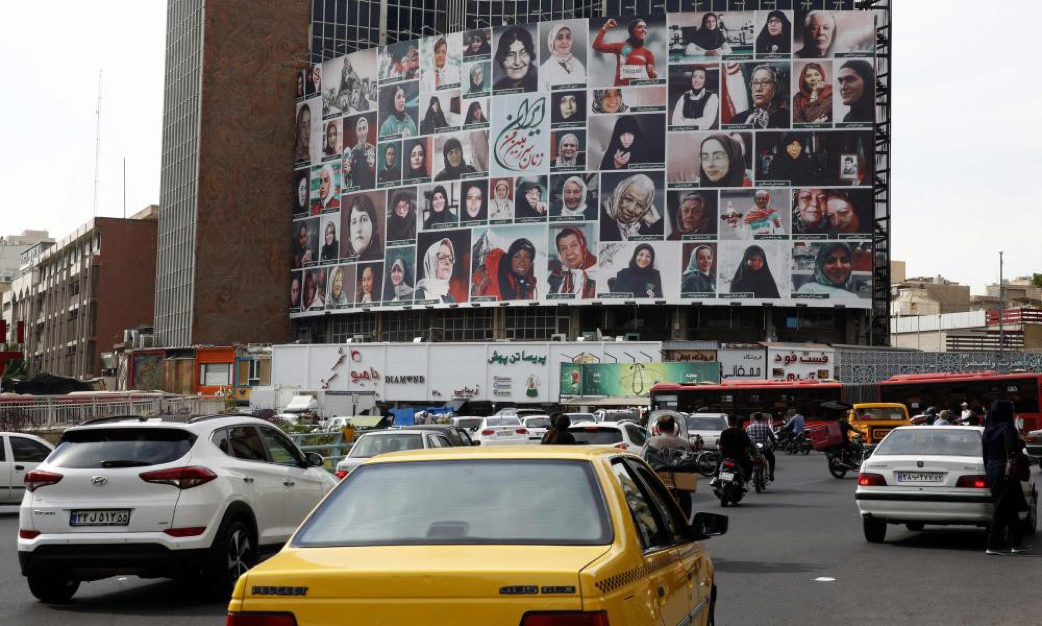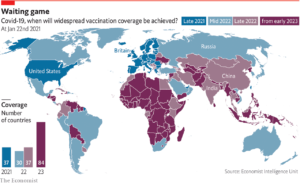Montage in Tehran taken down within 24 hours after prominent women and relatives denounce use of their photos
The Iranian authorities suffered a PR fiasco after being forced to take down a giant billboard in a central square in Tehran when women in the poster, or their relatives, objected to being depicted as supporters of the government and the compulsory-wearing of the hijab.
The billboard controlled by the Islamic Revolutionary Guards Corps was a montage of about 50 Iranian women wearing the hijab under the slogan “Women of my Land”. It was taken down within 24 hours after at least three of the women pictured said they objected to their image being misused.
Fatemeh Motamed-Arya, a multiaward-winning actor was the first to protest, releasing a video. Not wearing the hijab, she said: “I am not considered a woman in a land where young children, little girls and freedom-loving youths are killed in its fields.”
“I am Mahsa’s mother, I am Sarina’s mother. I am the mother of all the children who were killed in this land. I am the mother of all the land of Iran, not a woman in the land of murderers,” she added, referring to Mahsa Amini, the 22-year-old Kurdish woman whose death in police custody sparked protests across Iran,and Sarina Esmaeilzadeh, 16, who Amnesty International has said was killed by security forces at a protest.
Soon after the video was released, the film director Marzieh Boroumand and the mountaineer Parvaneh Kazemi also denounced the use of their image on the billboard.
Boroumand wrote on her Instagram account: “Gentlemen, remove my photo from the wall under which you oppressed children and young people. I will never allow any group inside or outside the country to use my cultural identity for their own benefit.”
She had previously posted a picture of Amini, along with the words: “I mourn for Mahsa and for all the values that we have lost in the name of religion.”
Kazemi, who has reached the summit of Everest and several 8,000-metre peaks, wrote on Instagram, saying: “So angry to see my picture in this poster. It’s a shame that the name and image of us women are used only for abuse.”
The son of the late actor Homa Rousta also objected to the “shameful” use of his mother’s image and called for it to be removed.
“My mother, Homa Rousta was with people throughout her personal and artistic life and lived with dignity and pride. For years, you even censored her name because of the name and position of her father, Reza Rousta. Now, after her death, you took possession of her image and installed it in a square where, thanks to you, I have witnessed the disgusting scene of intimidation and disrespect to men and women with my own eyes every day,” Kaveh Samandarian wrote on Instagram.
In a tweet, the director and screenplay writer Reza Dormishian pointed to the photo of an Iranian actor that came from one of his films, and said another image was of the photojournalist, Nooshin Jafari, who is serving a four-year term in Evin prison for insulting the state. Radical film-makers have been in and out of court for more than a decade.
The Revolutionary Guards Corps reinstated the offending billboard with the same wording, but without any photographs.
The episode underlines the extent to which many Iranian celebrities and sports stars have been expressing their support for the protests in Iran, leading to threats by the government that they will be punished or fined if they continue to do so.
Mehrdad Moazzami, the director of public relations of the Owj Arts and Media Organisation, tried to play down the conflict, saying the poster would be modified adding: “As a media art organisation, we have always taken into consideration the unity of dear Iran.”
Some of the photos appear to have been taken from tombstones.
Supporters of the government said the poster had been taken down because it included a suspect in the protests, but did not identify the individual.
Amnesty said on Friday that Iranian security forces have killed at least 23 children during the protests, including 20 boys aged 11-17 and three girls, two aged 16 and a 17-year-old.
The human rights group said it had so far recorded the names of 144 people killed during the demonstrations, but it believed the true death toll was higher.
Iran’s supreme leader, Ayatollah Ali Khamenei, said on Friday that no one should dare think they can uproot the Islamic Republic, in his toughest warning yet to protesters.
Khamenei compared the Islamic Republic to an unshakeable tree. “That seedling is a mighty tree now and no one should dare think they can uproot it,” he said in remarks shown on state TV.
Reuters contributed to this report




